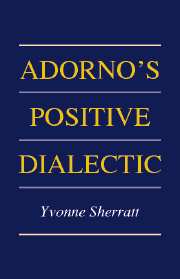Book contents
- Frontmatter
- Contents
- Preface
- Abbreviations
- Adorno's Positive Dialectic
- General Introduction
- PRELUDE TO ADORNO'S POSITIVE DIALECTIC
- Prelude I: Adorno's Intellectual Tradition: German Philosophy
- Prelude II: Adorno's Intellectual Tradition: Sigmund Freud
- ADORNO'S POSITIVE DIALECTIC: INTRODUCTION
- PART I NEGATIVE THESIS: THE DECLINE OF ENLIGHTENMENT
- 1 The Decline of Subjectivity: The Instincts
- 2 The Decline of Subjectivity: Narcissism
- 3 The Decline of Knowledge Acquisition
- 4 Knowledge Acquisition: A Negative Solution
- PART II POSITIVE THESIS: THE REDEMPTION OF ENLIGHTENMENT
- Bibliography
- Index
4 - Knowledge Acquisition: A Negative Solution
Published online by Cambridge University Press: 10 August 2009
- Frontmatter
- Contents
- Preface
- Abbreviations
- Adorno's Positive Dialectic
- General Introduction
- PRELUDE TO ADORNO'S POSITIVE DIALECTIC
- Prelude I: Adorno's Intellectual Tradition: German Philosophy
- Prelude II: Adorno's Intellectual Tradition: Sigmund Freud
- ADORNO'S POSITIVE DIALECTIC: INTRODUCTION
- PART I NEGATIVE THESIS: THE DECLINE OF ENLIGHTENMENT
- 1 The Decline of Subjectivity: The Instincts
- 2 The Decline of Subjectivity: Narcissism
- 3 The Decline of Knowledge Acquisition
- 4 Knowledge Acquisition: A Negative Solution
- PART II POSITIVE THESIS: THE REDEMPTION OF ENLIGHTENMENT
- Bibliography
- Index
Summary
INTRODUCTION
In the previous three chapters we have seen a story of unrelenting failure. The question posed by this story is, how to solve it, How do we rescue enlightenment from its decline into myth? Adorno seeks a solution ‘epistemologically’. He seeks to prevent the decline of enlightenment to myth by introducing a new mode of thinking which he terms ‘non-identity thinking’. We depict this solution and argue that Adorno's ‘epistemological’ solution to the problem of enlightenment knowledge acquisition's decline, is extremely limited in its effectiveness. (Note that this chapter is rather distinct from our previous chapters, for it consists of a much more detailed and analytic treatment of Adorno's unusual concepts, identity and non-identity thinking.)
In this chapter we discuss first, Adorno's conception of the relationship between enlightenment and myth, which is dialectical. Second, we view the decline of enlightenment knowledge acquisition through its dialectical regression into its animistic variant. Third, we make an isolated analysis of Adorno's notion of non-identity thinking. Fourth, we analyse the impact of non-identity thinking upon enlightenment knowledge acquisition. Finally, we assess the limitations of this merely ‘negative solution’.
DIALECTIC: MYTH AND ENLIGHTENMENT
A dialectical relationship means that two entities are inextricably connected and in opposition. The aspect of the dialectic that involves ‘opposition’, means that myth opposes enlightenment and enlightenment opposes myth. In Adorno's words, enlightenment ‘destroys myth’ (Adorno and Horkheimer, 1979: 44 [DA 61]). We have seen myth's opposition to enlightenment, resulting in the latter's regression.
- Type
- Chapter
- Information
- Adorno's Positive Dialectic , pp. 126 - 148Publisher: Cambridge University PressPrint publication year: 2002



